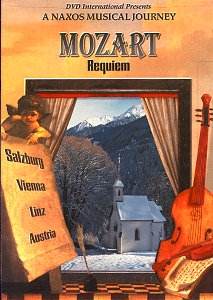What we have here is a DVD in travelogue mode, a series
of filmed themes, usually locations, accompanied
by the music of Mozart's Requiem. Or you could look at it as
a performance of Mozart's Requiem accompanied by pretty pictures. The
thematic connections between the shots and the Mass content is not subtle
and frequently there is none at all that I could discern. The Requiem
connotations are acknowledged by a high incidence of the insides and
outsides of cathedrals and churches and, as you might expect, cemeteries.
The Mozart connection is represented by locational shooting at Salzburg,
Vienna and Linz. Music and death are brought together symbolically by
filming, in two sections, the tombs and statues of famous composers,
a party that Goethe mysteriously manages to gate crash. Among more literal
references are a skull shown at the end of the Requiem aeternam and
an icon of a lamb at the end of the Agnus Dei! Each of the fourteen
sections of the mass are given a separate visual theme, for example
it may be Linz Cathedral, an alpine landscape or pictures at a museum.
All is stunningly filmed with a sense of movement that
more or less catches the mood of the music.
As for the music, Naxos marketed this performance of
the Requiem a few years ago as a CD and very good it is too. It was
a typical Naxos production. The orchestra for some – dare I say it -
an obscure East European outfit and singers not widely known but a performance
that confounds. Distinguished veteran Zdenek Kosler conducts with a
sure sense of tempo and the Slovakian performers play and sing incisively.
Soloists are solid and the bass voice of Peter Mikulás is splendidly
fruity. Although the performance has a certain steady gravitas it does
not set out to plumb the deepest depths, but it is refreshing in its
full blooded approach.
The performance is not touched by the authentic instruments
movement nor noticeably informed by latest scholarship on performing
practice and issues around authorship of those parts of the Mass that
Mozart did not finish . In other words it has not suffered "assault
by scholarly pedants", or the attentions of what Norman Lebrecht
called, in discussing the Requiem, "the secret police of
the period-instrument tendency". Maybe the police have not managed
to infiltrate Slovakia yet. The performance is none the worse for that.
The sound is good and will be impressive if you can put it through your
Hi Fi or surround sound.
At bargain price the CD was excellent value and this
'travelogue' version is, likewise, in DVD terms, cheap at under $20
and I’ve seen it advertised for significantly less. But also in DVD
terms the production is very much a no frills affair.
First, there is less than one hour of music/film plus
some trailers (the original Naxos CD had a great deal more music)
Second, there is no booklet.
Third, some of the information you might expect to
find in a booklet, such as something about Mozart, the composition of
the Requiem and its unfinished issue, can be found by navigating
the DVD but it is fairly minimal and no text of the Mass is provided.
Fourth, information on the locations that we are watching,
although available via the menu, is not accessible when and where you
want it. For example, when I started to play the disc I was confronted
with stunning pictures of a beautiful rural church, cemetery and environs.
I assumed it was somewhere in Austria but was dying to know the facts.
Where was it? how old was it? did it have a Mozart connection? To get
this detail you would have to go to the menu and find the notes for
that particular section and in doing so would have to lose the music
and pictures, then restart the chapter you were at. I did discover (there
are no instructions about this) that if I switched on the subtitle facility,
then at the start of each section a line is screened on the location,
but this may be little more than "landscape". You cannot access
the notes while the music is playing. The most obvious and convenient
solution would have been to print the notes in a booklet to which reference
could be made at will.
John Leeman
